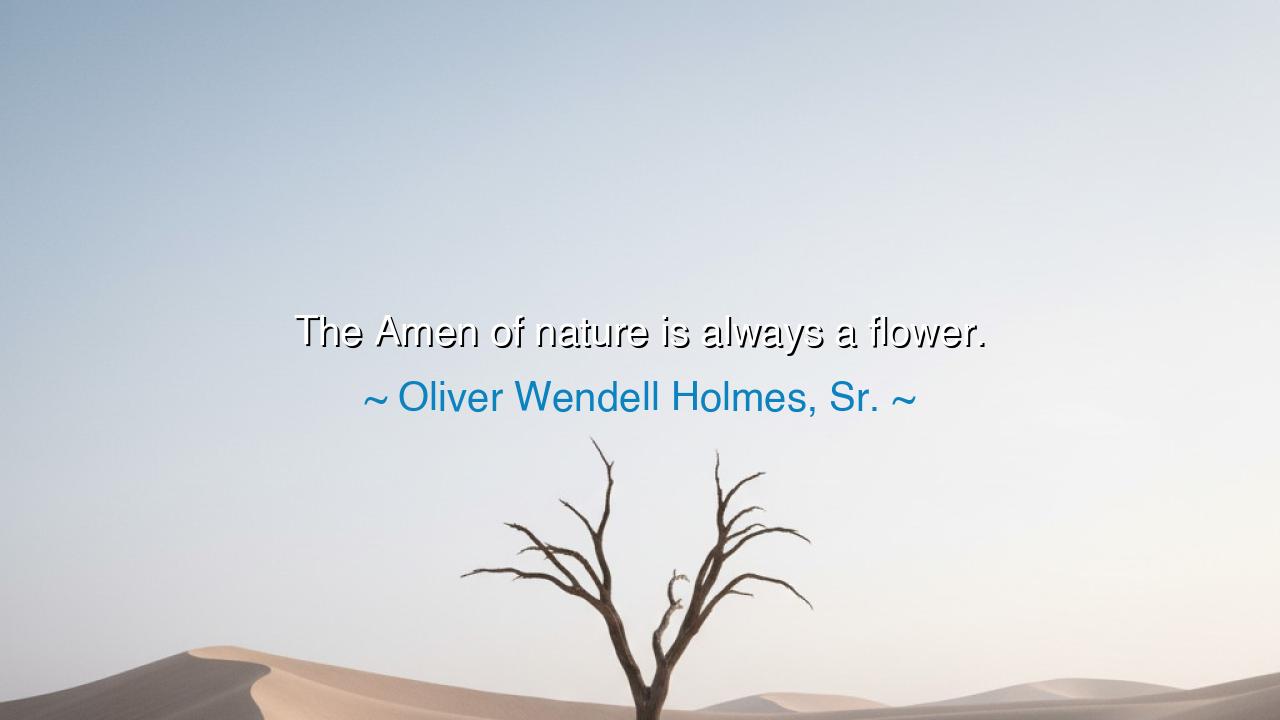
The Amen of nature is always a flower.






Hear, O listener, the words of Oliver Wendell Holmes, Sr., poet and healer of souls: “The Amen of nature is always a flower.” In this brief yet profound utterance, Holmes proclaims that every prayer of the earth, every struggle of root and soil, every hymn of rain and sun, finds its final seal, its sacred “so be it,” in the blossoming of a flower. Just as the word “Amen” concludes the prayers of mankind, so does the flower stand as the benediction of creation, the final and perfect expression of life’s striving.
The origin of this truth lies in Holmes’ deep love for both science and poetry. As a physician, he studied the intricacies of the human body, and as a writer, he looked upon nature with reverent eyes. He saw that the flower is not mere ornament, but culmination: the fruit of patient growth, the visible triumph of unseen forces. Earth, water, air, and sun all labor in silence, but the flower is the visible sign that their hidden work has reached its purpose. Thus, it is the “Amen” of the living world—the final word of beauty uttered after the long prayer of life.
Consider the tale of the cherry blossoms in Japan. Each spring, when the trees erupt in clouds of pale pink, the people gather in awe beneath them. For a few fleeting days, the blossoms remind all who see them of the brevity of life and the wonder of its bloom. The season is short, but in its brevity lies its power. This, too, is Holmes’ vision: the flower, delicate and passing, is the sacred seal of time, the Amen whispered by nature after the long patience of winter.
So it is also in the story of nations. When World War I ended, and the fields of Flanders were scarred with trenches and blood, it was the poppy that grew upon the graves of the fallen. Amid ruin, the red flowers declared the endurance of life. They became symbols of remembrance, of sacrifice, and of hope. In them the world heard nature’s Amen—a final word of both mourning and renewal, as if the earth itself prayed for peace through its blossoms.
The meaning of Holmes’ words is both tender and heroic. Every flower teaches that beauty is the destiny of labor. The root struggles unseen, the stem bends in storms, the bud waits in patience, but at last comes the Amen—a bloom that blesses the eye, the heart, and the spirit. It tells us that no struggle is wasted, no hidden labor in vain. The flower is the universe’s assurance that effort bears fruit, that patience yields beauty, that life ends not in silence but in a benediction of color and fragrance.
Thus the lesson for you, child of time, is this: live your days so that your life too may bloom. Do not despise the hidden seasons of struggle, nor the long prayers of toil and waiting. For in their due hour, your spirit shall bear its own flower, the Amen of your journey. It may be an act of kindness remembered, a work well wrought, a child raised in love, or a word that inspires generations. Your bloom may be brief, but in its brevity lies its eternal power.
Practical steps are clear: cultivate patience in your labor, trust in the seasons of your life, and honor the flowers around you as holy signs of completion. Plant gardens—whether in soil or in the hearts of others—and tend them faithfully. Let your words and deeds be seeds, your character the root, your perseverance the stem. And in the end, when the time is ripe, may your life bear blossoms that others will look upon and whisper: “Amen.”
Therefore remember Holmes’ teaching: “The Amen of nature is always a flower.” Every bloom you behold is not mere decoration, but a prayer fulfilled. Every blossom is the earth’s voice saying, “It is finished, it is blessed, it is good.” Walk among flowers, then, as among sacred texts, and let their beauty remind you that life, in all its striving, is destined to bloom.






AAdministratorAdministrator
Welcome, honored guests. Please leave a comment, we will respond soon